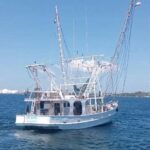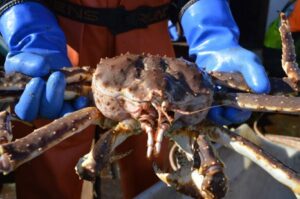Daily Archives: January 27, 2017
International Pacific Halibut Commission approves increases in halibut catch limits
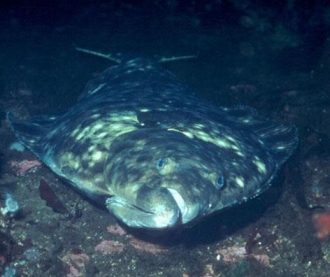 Most parts of the Pacific coastline will see an increase in commercial and charter fishing catch limits for halibut this year. The International Pacific Halibut Commission Friday approved a coast-wide catch limit of 31.4 million pounds of the valuable bottom fish. That’s an increase from just under 30 million pounds last year. Several parts of the coast were facing catch limit cuts based on alternatives presented by IPHC scientists. However, commissioners voted to boost harvest limits instead of making reductions. There was some disagreement about the BC catch limit this year. Listen to the audio report or read it here 19:11
Most parts of the Pacific coastline will see an increase in commercial and charter fishing catch limits for halibut this year. The International Pacific Halibut Commission Friday approved a coast-wide catch limit of 31.4 million pounds of the valuable bottom fish. That’s an increase from just under 30 million pounds last year. Several parts of the coast were facing catch limit cuts based on alternatives presented by IPHC scientists. However, commissioners voted to boost harvest limits instead of making reductions. There was some disagreement about the BC catch limit this year. Listen to the audio report or read it here 19:11
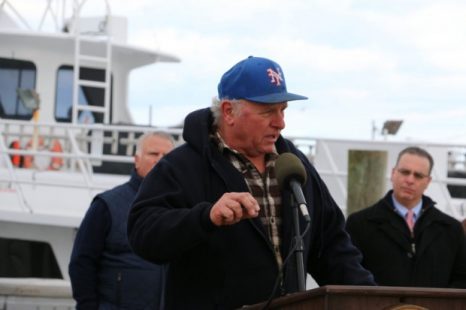
N.J. fishermen, officials demand feds back off of proposed flounder limits
In a unified show of support, New Jersey officials and leaders of the state’s fishing industry said Friday they are demanding the federal government abandon plans to cut the amount of fluke to be harvested this year. Insisting the proposed new limits will devastate an industry important to New Jersey’s economy, the government and industry representatives said they’re prepared to mount a legal fight, if necessary, to fight “ridiculous” limits that were based on “flawed” data. Jim Lovgren, a fishing boat captain and director of the Fishermen’s Dock Cooperative, said fishermen already experienced a 30-percent reduction in limits last year and face yet another 17- or 18-percent cut next year. The Point Pleasant Beach cooperative he heads pulls in about 2 million pounds of flounder annually. “Taking 30 percent of that last year hurt. It hurt me economically. It hurt everybody over there. It hurt everybody here,” he said to the crowd. Photo gallery of 21 images, Read the story here 16:54
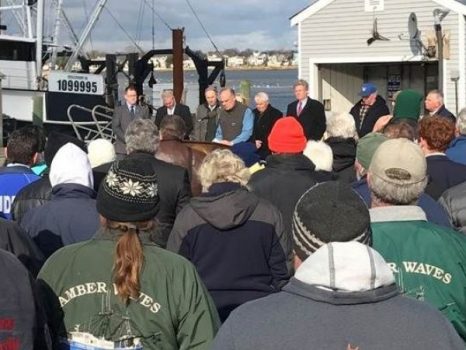
DEP Commissioner Bob Martin Says Proposed Fluke Quota Cut Would Cripple Fishing, Kill Jobs
Proposals that would cut New Jersey’s share of the fluke fishing quota in by 50 percent would cripple the fishing industry, kill potentially thousands of jobs and damage the state’s tourism industry, state Department of Environmental Protection Commissioner Bob Martin said Friday. Martin joined federal and state lawmakers, leaders of the state’s recreational and commercial fishing industries, anglers, and people whose livelihoods rely on fishing at a rally in Point Pleasant Beach to oppose the proposed drastic cuts to the recreational harvest of summer flounder, also known as fluke. The rally follows votes last month by the Atlantic States Marine Fisheries Commission and the Mid-Atlantic Fishery Management Council that would likely result in an increase in the size of individual summer flounder anglers can keep, as well as a decrease in number of fish that may be kept each day, and a reduction in season length. Read the rest of the story here 15:36
These California and Oregon farmers lost water in 2001. Now they want to be paid.
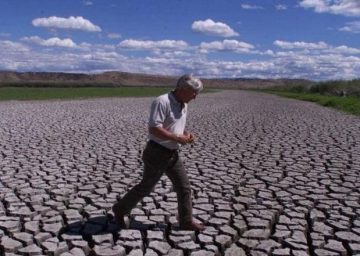 Northern California and Oregon farmers who lost irrigation water in 2001 for the sake of fish are plunging into a climactic courtroom battle for tens of millions of dollars in compensation. Years in the making, the trial set to start Monday in the U.S. Court of Federal Claims near the White House involves a lot of money, but that’s not all. For other Westerners, too, it can have broader implications, clarifying what the government may owe for water steered away from crops toward environmental protection. “It’s a civil rights case, at bottom,” farmers’ attorney Nancie Marzulla said in an interview. “It involves the protection of private property. We all expect the government to respect private property rights.” The same court ruled in 2001, for instance, that the federal government had taken water without paying compensation to California’s Tulare Lake Basin Water Storage District and others that had been deprived of water for the sake of the delta smelt and the winter-run chinook salmon. The judge later concluded the water districts were owed $13.9 million plus interest, and the case is still cited. Read the rest of the story here 15:10
Northern California and Oregon farmers who lost irrigation water in 2001 for the sake of fish are plunging into a climactic courtroom battle for tens of millions of dollars in compensation. Years in the making, the trial set to start Monday in the U.S. Court of Federal Claims near the White House involves a lot of money, but that’s not all. For other Westerners, too, it can have broader implications, clarifying what the government may owe for water steered away from crops toward environmental protection. “It’s a civil rights case, at bottom,” farmers’ attorney Nancie Marzulla said in an interview. “It involves the protection of private property. We all expect the government to respect private property rights.” The same court ruled in 2001, for instance, that the federal government had taken water without paying compensation to California’s Tulare Lake Basin Water Storage District and others that had been deprived of water for the sake of the delta smelt and the winter-run chinook salmon. The judge later concluded the water districts were owed $13.9 million plus interest, and the case is still cited. Read the rest of the story here 15:10
Bumble Bee Pleads Guilty in Industrial Oven Death of Worker Jose Melena
 Bumble Bee LLC pleaded guilty Wednesday to a misdemeanor charge stemming from the death of a Wilmington man who was cooked for two hours while trapped inside an industrial oven working at the company’s Santa Fe Springs plant. “I’ve … been a prosecutor for more than 20 years. I’ve tried more than 40 murder cases, and this is the worst circumstances of death I have ever, ever witnessed,” a deputy D.A. said. “I think any person would prefer to be, if they had to die some way … to be shot or stabbed than to be slowly cooked to death in an oven.” The pleas — which were anticipated under a $6 million settlement reached with the San Diego-based company in 2015 — stem from the Oct. 11, 2012, death of 62-year-old Jose Melena. Melena entered a 35-foot-long cylindrical oven used to sterilize cans of tuna at the plant. Co-workers, who were unaware that he was inside the oven, loaded 12,000 pounds of canned tuna and inadvertently trapped him in the back of the oven. He was found dead after the two-hour sterilization process. After the 2015 hearing, Chun described the circumstances of Melena’s death as “about as bad as you can imagine.” Read the rest of the story here 13:31
Bumble Bee LLC pleaded guilty Wednesday to a misdemeanor charge stemming from the death of a Wilmington man who was cooked for two hours while trapped inside an industrial oven working at the company’s Santa Fe Springs plant. “I’ve … been a prosecutor for more than 20 years. I’ve tried more than 40 murder cases, and this is the worst circumstances of death I have ever, ever witnessed,” a deputy D.A. said. “I think any person would prefer to be, if they had to die some way … to be shot or stabbed than to be slowly cooked to death in an oven.” The pleas — which were anticipated under a $6 million settlement reached with the San Diego-based company in 2015 — stem from the Oct. 11, 2012, death of 62-year-old Jose Melena. Melena entered a 35-foot-long cylindrical oven used to sterilize cans of tuna at the plant. Co-workers, who were unaware that he was inside the oven, loaded 12,000 pounds of canned tuna and inadvertently trapped him in the back of the oven. He was found dead after the two-hour sterilization process. After the 2015 hearing, Chun described the circumstances of Melena’s death as “about as bad as you can imagine.” Read the rest of the story here 13:31
Coast Guard medevacs fisherman near Cold Bay, Alaska
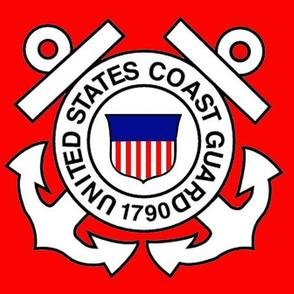 A Coast Guard Air Station Kodiak MH-60 Jayhawk rescue helicopter crew forward deployed in Cold Bay, medevaced a man from the fishing vessel American Dynasty approximately 60 nautical miles north of Cold Bay, Thursday afternoon. The 59-year-old fisherman was hoisted and transported to Cold Bay where he was met by Guardian Flight personnel for further transfer to Anchorage. Watchstanders at Coast Guard District Seventeen received notification from Health Force Partners requesting a medevac for a crewmember aboard the American Dynasty who was suffering from symptoms of appendicitis. The duty flight surgeon recommended the medevac and the helicopter crew was dispatched. Weather on scene during the time of the medevac was reported as 20-mph winds with six to eight-foot seas and four miles of visibility. link 10:46
A Coast Guard Air Station Kodiak MH-60 Jayhawk rescue helicopter crew forward deployed in Cold Bay, medevaced a man from the fishing vessel American Dynasty approximately 60 nautical miles north of Cold Bay, Thursday afternoon. The 59-year-old fisherman was hoisted and transported to Cold Bay where he was met by Guardian Flight personnel for further transfer to Anchorage. Watchstanders at Coast Guard District Seventeen received notification from Health Force Partners requesting a medevac for a crewmember aboard the American Dynasty who was suffering from symptoms of appendicitis. The duty flight surgeon recommended the medevac and the helicopter crew was dispatched. Weather on scene during the time of the medevac was reported as 20-mph winds with six to eight-foot seas and four miles of visibility. link 10:46
Federal Fisheries Minister Dominic LeBlanc says Canada has a right to scientific analysis of Corexit
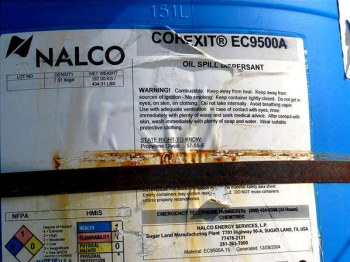 Canada’s fisheries minister is pushing back against a U.S. company that is refusing to let Canadian researchers test its oil spill dispersant. “We obviously have a huge concern about a potential corporate interest that appears to not want to have robust, thoughtful, independent scientific analysis of their product,” said Dominic LeBlanc. LeBlanc, speaking in Halifax, was talking about the months-long impasse over his department’s attempt to test Corexit 9580, a surface-washing agent used to clean beaches in oil spills. The product, along with Corexit 9500 — an open-water oil dispersant — were approved for use in Canada last year on a case-by-case basis if authorities determine there is a net environmental benefit. Read the rest here 09:57
Canada’s fisheries minister is pushing back against a U.S. company that is refusing to let Canadian researchers test its oil spill dispersant. “We obviously have a huge concern about a potential corporate interest that appears to not want to have robust, thoughtful, independent scientific analysis of their product,” said Dominic LeBlanc. LeBlanc, speaking in Halifax, was talking about the months-long impasse over his department’s attempt to test Corexit 9580, a surface-washing agent used to clean beaches in oil spills. The product, along with Corexit 9500 — an open-water oil dispersant — were approved for use in Canada last year on a case-by-case basis if authorities determine there is a net environmental benefit. Read the rest here 09:57
Wakulla Fishermen Losing Traditional Harvest Areas, Call for End to Leasing
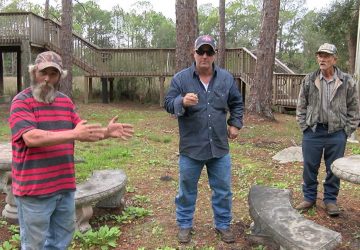 Fishermen in Wakulla County are concerned about the rise in the amount of leases on their waters. The leases provide boundaries as to where fishermen can and cannot go to get fish. Poles and barriers indicate assigned zones. Some fishermen say their boats have been damaged by them, claiming poor visibility due to a lack of lighting and the tide changing sea levels. Fishermen say the state keeps giving leases out, which zones off territory they’ve used for years. “It’s killing all of us up here,” said Albert Hartsfield, vice president of the Wakulla Commercial Fishermen’s Association (WCFA). “They’ve blocked up channels and everything.” “Don’t put my guys out of business,” said John Taylor, president of the WCFA. “They need this water to make their livelihood.” Video, Read the rest here 09:01
Fishermen in Wakulla County are concerned about the rise in the amount of leases on their waters. The leases provide boundaries as to where fishermen can and cannot go to get fish. Poles and barriers indicate assigned zones. Some fishermen say their boats have been damaged by them, claiming poor visibility due to a lack of lighting and the tide changing sea levels. Fishermen say the state keeps giving leases out, which zones off territory they’ve used for years. “It’s killing all of us up here,” said Albert Hartsfield, vice president of the Wakulla Commercial Fishermen’s Association (WCFA). “They’ve blocked up channels and everything.” “Don’t put my guys out of business,” said John Taylor, president of the WCFA. “They need this water to make their livelihood.” Video, Read the rest here 09:01
Experts say BC salmon stocks not diminished by sea lice outbreak for now
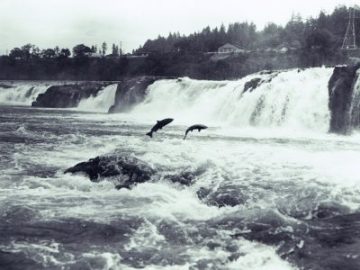 The price of salmon has shot up more than 15 per cent over the last three months, thanks to fish stocks being hit worldwide by an outbreak of sea lice. In Norway and Scotland, two of the world’s largest suppliers of salmon, sea lice outbreaks have made prices rise by a full 50 per cent, coupled with a huge algae bloom in Chile, the world’s second biggest producer of farmed salmon, and global production is down by nine per cent. But the market for Pacific salmon is not likely to see the same price spikes, according to Glen Spain of the Pacific Coast Federation of Fishermen’s Associations, who says that sea lice has so far been less of a scourge for Pacific Coast salmon. The tiny, naturally occurring parasite, found in both wild and farmed salmon, last proved to be a menace on the West Coast in 2015, when infestations were at their highest in five years. Read the story here 07:49
The price of salmon has shot up more than 15 per cent over the last three months, thanks to fish stocks being hit worldwide by an outbreak of sea lice. In Norway and Scotland, two of the world’s largest suppliers of salmon, sea lice outbreaks have made prices rise by a full 50 per cent, coupled with a huge algae bloom in Chile, the world’s second biggest producer of farmed salmon, and global production is down by nine per cent. But the market for Pacific salmon is not likely to see the same price spikes, according to Glen Spain of the Pacific Coast Federation of Fishermen’s Associations, who says that sea lice has so far been less of a scourge for Pacific Coast salmon. The tiny, naturally occurring parasite, found in both wild and farmed salmon, last proved to be a menace on the West Coast in 2015, when infestations were at their highest in five years. Read the story here 07:49






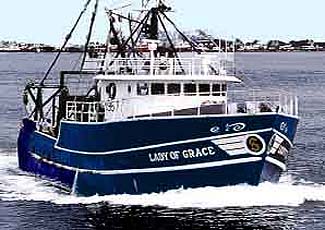 On this day in 2007, the Coast Guard launched a massive search for the Fishing Vessel Lady of Grace after the 75-foot dragger failed to return as scheduled to New Bedford. The four-man crew of the boat was last heard from the night before, struggling to cross Nantucket Sound in a winter gale with 6- to 9-foot seas buffeting the Sound. Using side scan sonar, Coast Guard personnel located the sunken vessel 12 miles south of Hyannis one day after the search began. The bodies of Lady of Grace captain Antonio Barroqueiro and crew member Mario Farinhas were recovered, but two other crew members, Rogerio Ventura and Joao Silva – were never found. Read the stories about this tragedy starting with previous problem with the boat
On this day in 2007, the Coast Guard launched a massive search for the Fishing Vessel Lady of Grace after the 75-foot dragger failed to return as scheduled to New Bedford. The four-man crew of the boat was last heard from the night before, struggling to cross Nantucket Sound in a winter gale with 6- to 9-foot seas buffeting the Sound. Using side scan sonar, Coast Guard personnel located the sunken vessel 12 miles south of Hyannis one day after the search began. The bodies of Lady of Grace captain Antonio Barroqueiro and crew member Mario Farinhas were recovered, but two other crew members, Rogerio Ventura and Joao Silva – were never found. Read the stories about this tragedy starting with previous problem with the boat 



























